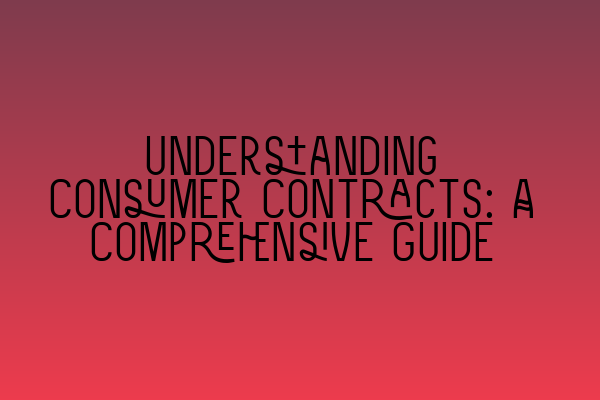Understanding Consumer Contracts: A Comprehensive Guide
In today’s increasingly complex marketplace, consumer contracts play a crucial role in protecting the interests of both consumers and businesses. As a solicitor, it is essential to have a solid understanding of consumer contracts and the legal framework surrounding them. In this comprehensive guide, we will walk you through the key aspects of consumer contracts, explain their importance, and provide practical insights to help you navigate this area of contract law.
What Are Consumer Contracts?
Consumer contracts are agreements entered into between a consumer and a business for the supply of goods or services. These contracts are governed by specific laws and regulations designed to protect consumers from unfair terms and practices. Whether it’s purchasing a new electronic device, signing up for a subscription service, or hiring a tradesperson for home renovations, consumer contracts are a part of our everyday lives.
The Importance of Consumer Contracts
Consumer contracts serve as a legal framework that ensures fairness and transparency in commercial transactions. They play a vital role in establishing the rights and responsibilities of both parties involved. By clearly defining the terms and conditions of a transaction, consumer contracts help prevent misunderstandings, disputes, and potential harm to consumers.
Understanding Consumer Rights and Protections
Consumers enjoy various rights and protections under consumer contract law, which shields them from unfair practices and ensures their interests are safeguarded. These rights include:
1. Right to clear information: Businesses have a legal obligation to provide consumers with clear and transparent information about the goods or services being offered, including their characteristics, pricing, terms of payment, and any applicable warranties.
2. Protection against unfair terms: Consumer contracts must not contain unfair terms that disproportionately favor the business over the consumer. Unfair terms are those that cause a significant imbalance in the rights and obligations of the parties and are contrary to good faith and fair dealing.
3. Right to cancellation: Many consumer contracts offer a cooling-off period, which allows consumers to cancel the agreement within a specified timeframe without penalty. This right is particularly relevant for distance selling contracts, where consumers purchase goods or services online or over the phone.
4. Remedies for breach of contract: If a business fails to fulfill its obligations under a consumer contract, consumers have the right to seek remedies such as refund, repair, replacement, or compensation for any resulting damages.
Key Considerations for Drafting Consumer Contracts
When drafting consumer contracts on behalf of businesses, solicitors need to ensure compliance with legal requirements and industry best practices. Some key considerations include:
1. Clear and concise language: Consumer contracts should be written in plain English, avoiding complex legal jargon that may confuse or mislead consumers. Using clear and concise language enhances transparency and helps consumers understand their rights and obligations.
2. Fair terms and conditions: Solicitors must review and verify that the contractual terms are fair and balanced, ensuring they do not attempt to unfairly limit or exclude consumer rights. Compliance with consumer protection legislation is paramount to protect businesses from potential legal repercussions.
3. Disclosures and disclaimers: It is essential to include all necessary disclosures and disclaimers to provide consumers with accurate information about the goods or services being offered. This may include details about potential risks, limitations, or exclusions.
4. Accessibility and readability: Consumer contracts should be easily accessible and presented in a format that is readable, whether in print or online. Providing clear headings, bullet points, and section breaks can facilitate comprehension and improve the overall user experience.
Conclusion
Consumer contracts form the backbone of our economic system, ensuring fair and transparent transactions between businesses and consumers. As a solicitor, understanding the legal framework of consumer contracts is crucial to protect the interests of your clients and promote consumer confidence in the marketplace. By adhering to best practices and staying updated on relevant legislation, you can navigate the complexities of consumer contract law with confidence.
Related Articles:
– Barrister vs. Solicitor: A Comprehensive Comparison
– Embracing the Rise of Virtual Law Practices
– Unveiling Real-Life Case Studies: Insights into Legal Practice and Decision-Making
– Exploring Solicitor Salaries in the UK: Average Earnings and Factors Affecting Income
– Mastering Client Relationship Management: Skills for Solicitors to Enhance Trust and Loyalty
